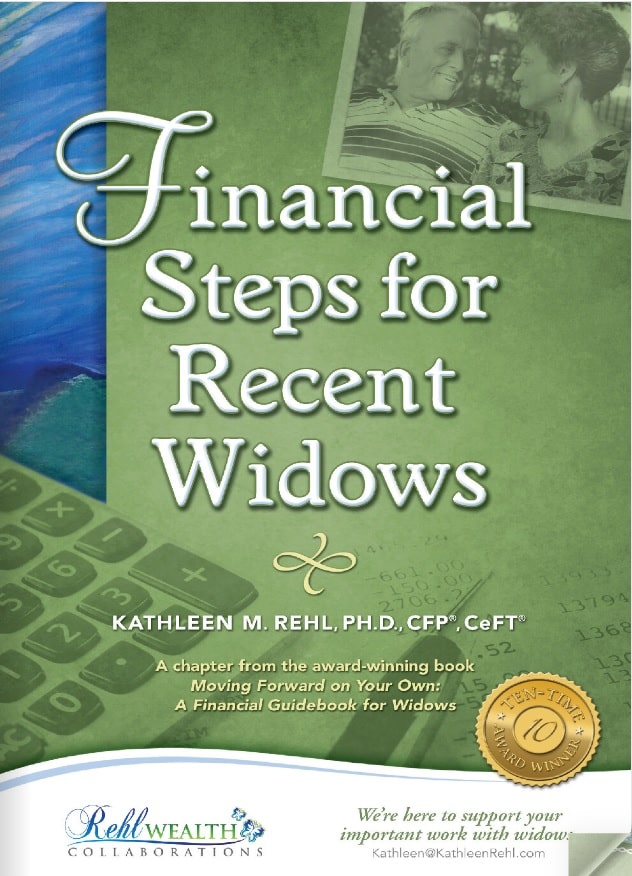
Sixteen years ago, my world shattered. That’s when cancer killed my beloved husband. A spouse’s likelihood of passing away is three times higher for women than men. Many women find that widowhood forces them to take on and make critical financial decisions during a particularly trying time.
My initial grief seemed unending, a relentless storm of anguish. However, as time passed, I began transitioning from that deep grief and intense mourning period into a time of growth – Stage 2 of widowhood.

Brain fog gradually lifts during this phase, and your thinking regains normalcy. A widow I spoke with put it perfectly when she said she no longer felt like she had “Jell-O brain” after her husband died. In this second stage of widowhood, it’s important to focus on the material aspects of your life, particularly your financial security. As you come to terms with life without your partner, you may need to make some important financial choices you had been putting off.
To review the 3 stages of widowhood, read my recent Sixty and Me article. By the end of Stage 1, many widows will have completed most actions outlined in Financial Steps for Recent Widows, a free eBooklet available on my website. In Stage 2, you’ll focus on new financial considerations.
Evaluate Your Financial Situation
Be honest with yourself about your income and spending habits. Your salary (if you still have one), retirement benefits like Social Security and pensions, and interest and dividends from investments all count. Consider ways to increase your income or decrease your expenses if there is a gap between the two. If you have a surplus, on the other hand, what does that mean for your future plans?
Maybe you were smart and invested the money you received from your spouse’s life insurance policy in a money market account. Now is the time to consider how those funds can be used in the long term.
Have you reached retirement age yet? If not, could you increase your earnings by investing in yourself and your professional development through additional training or education? Have you considered phased retirement rather than full-time retirement if you need extra income?
Consider whether staying in your current home is feasible or moving to a smaller, less expensive place makes sense. If you own a second home and your spouse has passed away, will you reconsider keeping it, especially if your spouse did all the repairs and upkeep? A second home can be a big financial drain.
Review Your Investments
Women in Stage 2 of widowhood can benefit from looking at all their investments, including stocks, bonds, cash, real estate, and alternative investments. Previously successful strategies that worked for you as a couple may no longer be optimal after your spouse’s passing. Do your plans make sense in light of your current financial situation?
For instance, if you’re worried about financial stability, you might want to diversify from your late spouse’s choice of high-risk investments. You may benefit from the advice of a true fiduciary advisor if you need assistance with these financial decisions.
In my situation, I was more knowledgeable about money than my late husband; however, after his death, I tweaked my investment portfolio a bit by increasing my holdings in stable U.S. treasury bonds and high-interest paying certificates of deposit. As I added new money to my retirement savings plans, that’s where I made additions for my future.
Two Key Tips for Widows
Don’t Be Controlled from the Grave
Just because your late husband bought an investment years ago doesn’t mean you must keep it, especially if you don’t understand it or it doesn’t fit your values. Some widows initially may feel disloyal in exchanging their late husband’s volatile stock holdings for new conservative choices that are more stable and secure.
You are not being unfaithful to your late spouse as you look to the future and what’s best for you. You can seek guidance to reallocate your assets into a diversified and balanced portfolio that suits your risk tolerance and goals for your current situation today.
2. Update Your Estate Plans
After settling your spouse’s estate, it’s crucial to revisit your own estate plans. Your previous legal will may have been as short and sweet as “Honey, I love you, and I give everything I own to you.” But now it’s time to decide how your assets should be distributed when you eventually pass on. Consider creating a new legal will that reflects what matters most to you. Depending on your situation, a trust may also be advisable. Consult with your advisors to ensure your estate plan satisfies your needs and desires.
Maintaining an up-to-date living will is critical for sharing your healthcare wishes, including those regarding artificial means of prolonging life. Give someone you trust the authority to make important decisions about your healthcare and finances if you become incapacitated.
Remember to designate new beneficiaries on your life insurance policies and retirement accounts, such as IRAs and U.S. savings bonds. Replace your husband’s name with the names of relatives or friends, and consider designating a charitable organization as a partial beneficiary. If you have minor children, plan for their protection, including life insurance on yourself, and naming guardians and financial custodians if you become incapacitated or otherwise unable to do so yourself.
After going through the loss of a spouse, it can be difficult to face your own mortality. But this preparation for death is a lasting present for your loved ones. Having your affairs in order will help avoid chaos after you pass away and ensure that your wishes are carried out.
You Are on Your Own but Not Alone
Many aspects play a role in transitioning through the stages of widowhood. That includes your financial confidence, health, age, the amount of help you receive from loved ones, and preparations you made before your husband’s death. But remember, in navigating your financial realities, you’re not alone.
Support, guidance, and strength to help secure your financial future are available, ensuring that you thrive in this new chapter of life on your own. A great resource filled with lots of free information is the Women’s Institute for a Secure Retirement. Especially note their section on widowhood.
In my next article, I’ll share how I and many other widows have moved from “Heartbreak to Breakthrough Living” in Stage 3 of widowhood.
Let’s Have a Conversation:
If you’re on the widow’s journey, do you remember moving from Stage 1 to Stage 2 of widowhood? What part was the hardest for you? What wise choices did you make with your money? Did you encounter any difficulties? We’d love to hear your thoughts.





